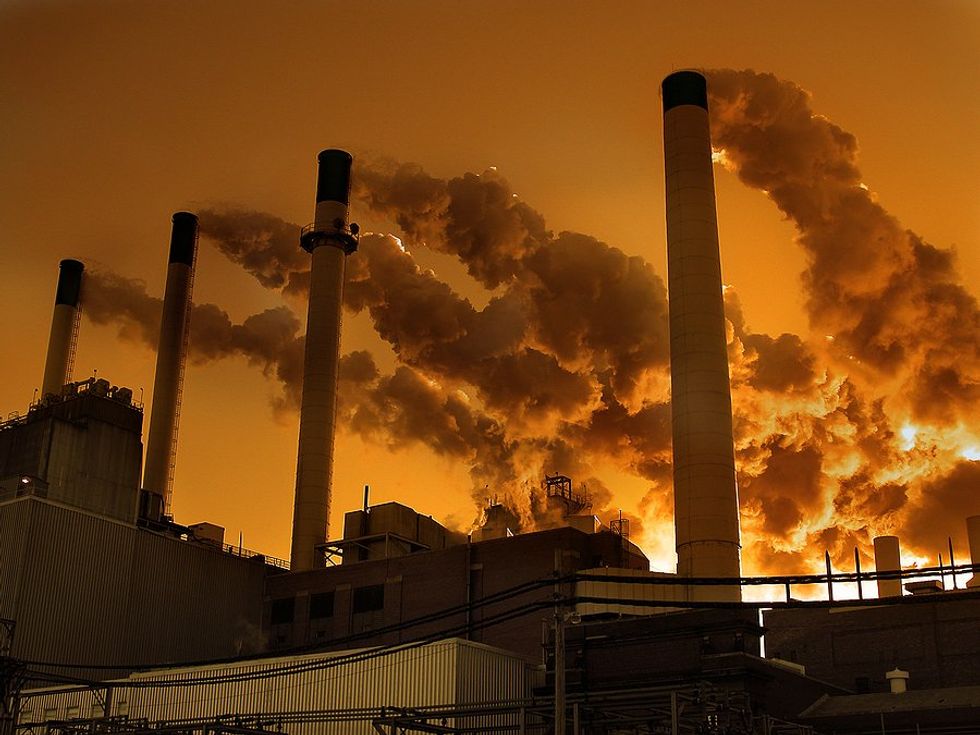The new method, which accounts for the ways numerous chemical exposures impact the entire body, found increased risks to people’s brains, hearts, lungs, kidneys, and hormonal systems from air pollution in a community near Philadelphia. Traditional methods found no increased health risks based on the same level of pollution exposure in that community.
“I think this [is a] holistic approach,” Pete DeCarlo, study co-author and a Johns Hopkins University associate professor who studies atmospheric air pollution, told EHN. “The cumulative burdens across multiple health systems for every chemical that we measure is really, really important, because we breathe everything all at once.”
Multiple chemical exposures impact multiple body parts
 Credit: Faux Toe/BigStock Photos ID: 1366970
Credit: Faux Toe/BigStock Photos ID: 1366970The study, conducted by researchers at Johns Hopkins University and Aerodyne Research Inc., a company that creates software and sensors for environmental research, differs from traditional risk models by accounting for simultaneous exposures to multiple chemicals and their potential impacts on multiple parts of the body.
Traditional regulatory approaches to analyzing health impacts from air pollution consider each chemical individually, rather than cumulatively. Limits are set based on the level of daily exposure to a chemical over a lifetime that is unlikely to cause harm. A chemical may harm different parts of the body at different concentrations, so this method uses the lowest harm-inducing concentration to begin regulation and then assumes other parts of the body won’t be affected, according to Keeve Nachman, study co-author and professor of environmental health and engineering at Johns Hopkins University.
“If we were exposed to one chemical at a time, that would be totally logical, right?” Nachman told EHN. “But the reality is that we are not exposed to one chemical at a time.”
The research team created an expanded method that would be able to better account for exposures to multiple chemicals by adding together their impacts to all parts of the body, not just the most sensitive.
The research team collected air samples from a mobile air monitor over a three-week period from communities along the Delaware River near Philadelphia that experience pollution from petrochemical refineries, municipal waste incinerators, and other industrial facilities.
Using this data, they conducted a non-cancer risk analysis for 32 volatile organic compounds, including formaldehyde, benzene, toluene, and xylenes (while some of these chemicals can cause cancer, analyzing cancer risk requires a different process).
“If we use the traditional approach to risk assessment, we don't find an elevated risk of any health endpoint in this community, nothing,” Nachman said. “So the result of using that risk assessment for making decisions would mean no change needed. We wouldn't need to intervene at all.”
But using their revised method, the researchers found increased risk of damage to the people’s brains, hearts, lungs, kidneys, and hormonal systems from the same level of air pollution exposure, which they say should prompt regulators to think differently about how industrial sites are permitted and regulated in communities across the country.
Empowering polluted communities
Heather McTeer Toney, former EPA Region 4 administrator and executive director of the environmental group Beyond Petrochemicals said this study confirms the experience of those who have been impacted by the petrochemical industry in Texas, Louisiana, and Appalachia for decades.
“We are validating what they have been saying, and that in and of itself is hope because it allows us to identify the problem,” Toney said. “And for so long people have been in and living in these spaces where people didn’t believe them.
The cumulative impact of these chemicals is “not only devastating, but generationally crushing,” Toney said. “[This discovery] should be a part of the decision-making process when we are thinking about what plant [to permit], where it’s going to go, and why we even need it in the first place.”
In an effort to make their research accessible and replicable, the researchers created a public database of the risk assessments for the chemicals they analyzed and plan to develop a tool to share in the future. DeCarlo and Nachman noted that the study has a few limitations, including the fact that they may not have a full picture of chemicals existing in the atmosphere and cannot accurately account for additional health stressors like poverty, social issues, or preexisting health conditions.
“While we think this paints a much more complete picture than the current way of looking at things, we still know that there's more things to add,” DeCarlo said. “There's more things to measure, and that would likely mean more health burden, but we're doing what we can with the data that we have right now.”
With the data they have right now, the research team believes they can make a positive impact.
“It’s a challenging time for cumulative risk research, people experiencing cumulative risk, [and] environmental injustices, but don’t lose hope,” Nachman said, reflecting on the Trump administration's efforts to roll back clean air protections, industry regulations, and public health research.
“Because I am confident that what we are helping contribute to…is a better set of methodologies that will account for these things, and that when that window opens back up for making smart policy that actually protects fenceline communities, we’re going to be ready with ways to do it.”
Editor’s note: The Johns Hopkins Bloomberg School of Public Health, Beyond Petrochemicals, and Environmental Health News receive funding from Bloomberg Philanthropies.



 Credit: Faux Toe/BigStock Photos ID: 1366970
Credit: Faux Toe/BigStock Photos ID: 1366970











